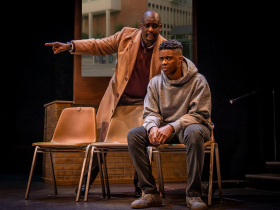Even the Program Notes Are Funny
Next Act’s ‘Pipeline’ is witty, insightful look at dilemmas posed for Black students, families at upscale school.
In amusing program notes, playwright Dominique Morisseau (great first name, by the way) encourages the patrons to murmur audibly in recognition, laugh at some of the slang putdowns (with respect to their neighbors), mutter in recognition of character types in a Black family (angry student, clinging girl friend, anxious mother, righteous divorced father, and so forth), vocalize if moved and “exhale together” when called for.
She has written a play, Pipeline, that moves us to do all of this, particularly as strongly guided by director Jamil A.C. Mangan and embodied by a personable, committed cast through March 6 at the Next Act Theatre.
The observation is built into the world of urban schools and its universal dilemma for Black students. Here are the families who move their students to expensive charter schools in the hope of protecting them from the “Pipeline” of the title (that’s the school-to-prison pipeline, though Morisseau just lets the pipeline word dangle since we know what it means and she wisely keeps prison out of the dialogue). Yet here comes the intelligent but angry Black student acting out violently at what is missing in his life in this supposedly better world. He has just read James Baldwin as he shoves a teacher. He is not sad but defiant.
Morisseau has avoided making this a polemic about all of our accountability by drawing the lessons in crisp, eloquent visions of why this is happening.
The cast is up to the challenge of making the dialogue smashingly funny and just smashing. Malaina Moore, who has been making a mark on Milwaukee stages with variations of this role, gets the full-blown chance she deserves as an alluring, self-absorbed, instinctive rather than intellectual girl friend who cheekily sizes up the divorced mother in the story and dissects her with that combination of smart-ass school girl and opinionated romantic that patrons will instantly recognize.
Ibraheem Farmer captures the essence of Omari, lost and confused by his violent streak, refusing to explain and then articulating his core, a performance that invites the audience into his personality and struggles. Will Sims II conveys the remarried, well-meaning but bullying father, sure the son’s problems are his ex-wife’s fault.
With a deceptively simple swagger and self-protective manner, James Carrington plays the school security worker who may have a deeper relationship with Nya than discussed. His meeting with the dad conveys waves of meaningful looks, as does the dad’s meeting with his son.
Also delightfully around as the older white teacher who longs for the good old days of paddling is Tami Workentin, fresh from her work at the Milwaukee Rep and here dominating her scenes with slightly dirty repartee and full-throated anger at the school system.
Morisseau skirts preaching but never abandons the polemic side of her purpose – we are all guilty of this emptiness facing young Black men. She wants to tie up her character studies with a neat bow at the end that suggests we all have lessons to learn. It might have been better to end the play a bit earlier and trust the patrons to wrap up their own package.
Pipeline Gallery
Dominique Paul Noth served for decades as film and drama critic, later senior editor for features at the Milwaukee Journal. You’ll find his blog here and here.
Review
-
New Musical a Life and Death Comedy
![Stephanie Beschta [Mrs. McCobb] and Shayne Patrick [Mr. McCobb] in RIP – A Matter of Life and Death. Photo by Stacy Kaat (www.stacykaat.com).](https://urbanmilwaukee.com/wp-content/uploads/2024/07/WEB-6056-185x122.jpg) Jul 19th, 2024 by Dominique Paul Noth
Jul 19th, 2024 by Dominique Paul Noth
-
Ouzo Café Is Classic Greek Fare
 May 23rd, 2024 by Cari Taylor-Carlson
May 23rd, 2024 by Cari Taylor-Carlson
-
‘The Treasurer’ a Darkly Funny Family Play
 Apr 29th, 2024 by Dominique Paul Noth
Apr 29th, 2024 by Dominique Paul Noth
Theater
-
New Musical a Life and Death Comedy
![Stephanie Beschta [Mrs. McCobb] and Shayne Patrick [Mr. McCobb] in RIP – A Matter of Life and Death. Photo by Stacy Kaat (www.stacykaat.com).](https://urbanmilwaukee.com/wp-content/uploads/2024/07/WEB-6056-185x122.jpg) Jul 19th, 2024 by Dominique Paul Noth
Jul 19th, 2024 by Dominique Paul Noth
-
‘The Treasurer’ a Darkly Funny Family Play
 Apr 29th, 2024 by Dominique Paul Noth
Apr 29th, 2024 by Dominique Paul Noth
-
Rep’s Nina Simone Play a Puzzle
 Apr 23rd, 2024 by Dominique Paul Noth
Apr 23rd, 2024 by Dominique Paul Noth

























